| Listing 1 - 10 of 14 | << page >> |
Sort by
|
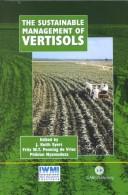
ISBN: 0851994504 9780851994505 Year: 2001 Publisher: Wallingford CABI Pub.
Abstract | Keywords | Export | Availability | Bookmark
 Loading...
Loading...Choose an application
- Reference Manager
- EndNote
- RefWorks (Direct export to RefWorks)
Book
Year: 2001 Publisher: [Auburn, Ala.] : USDA, Natural Resources Conservation Service,
Abstract | Keywords | Export | Availability | Bookmark
 Loading...
Loading...Choose an application
- Reference Manager
- EndNote
- RefWorks (Direct export to RefWorks)
Humus --- Humification --- Range management --- Soil management --- United States.
Book
ISBN: 9057090163 9789057090165 Year: 2001 Publisher: Paris: Éd. des archives contemporaines,
Abstract | Keywords | Export | Availability | Bookmark
 Loading...
Loading...Choose an application
- Reference Manager
- EndNote
- RefWorks (Direct export to RefWorks)
Agronomy --- Agriculture --- Crops --- Soil management --- History --- Agronomie --- Chimie agricole --- Histoire. --- Innovations technologiques --- Agronomy - France - History - 19th century --- Agronomy - France - History - 20th century --- Agronomy - Germany - History - 19th century --- Agronomy - Germany - History - 20th century
Periodical
ISSN: 16774310 19831471 Year: 2001 Publisher: Cascavel-Paraná : Marechal Cândido Rondon, Paranâ : Universidade Estadual do Oeste do Paraná/Unioeste Universidade Estadual do Oeste do Paraná, Campus de Marechal Cândido Rondon
Abstract | Keywords | Export | Availability | Bookmark
 Loading...
Loading...Choose an application
- Reference Manager
- EndNote
- RefWorks (Direct export to RefWorks)
Agriculture --- Animal culture --- Agronomy --- Elevage --- Agronomie --- Periodicals. --- Periodicals --- Périodiques --- Agriculture. --- Agronomy. --- Animal culture. --- Brazil --- agrarian sciences --- animal sciences --- agronomic sciences --- sustainable rural development --- forest science --- Animal husbandry --- Husbandry, Animal --- Zoology, Economic --- Crops --- Soil management --- Farming --- Husbandry --- Industrial arts --- Life sciences --- Food supply --- Land use, Rural
Periodical
ISSN: 16147480 14390108 Year: 2001 Publisher: Landsberg, Germany ; Fort Worth, TX : Ecomed Pub.,
Abstract | Keywords | Export | Availability | Bookmark
 Loading...
Loading...Choose an application
- Reference Manager
- EndNote
- RefWorks (Direct export to RefWorks)
Soil protection --- Soil pollution --- Sedimentation and deposition --- Sedimentation and deposition. --- Soil pollution. --- Soil protection. --- Protection, Soil --- Protection of soils --- Soils, Protection of --- Contamination of soil --- Soil contamination --- Deposition and sedimentation --- Sedimentary processes --- Environmental protection --- Pollution --- Soils --- Soil remediation --- Soil salinization --- Physical geology --- Environmental aspects --- Soil conservation --- Conservation of soil --- Erosion control, Soil --- Soil erosion --- Soil erosion control --- Agricultural conservation --- Soil management --- Control --- Prevention --- Conservation
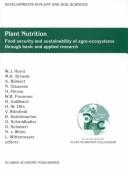
ISBN: 0792371054 9780792371052 9786610201105 128020110X 030647624X Year: 2001 Volume: 92 Publisher: Dordrecht: Kluwer,
Abstract | Keywords | Export | Availability | Bookmark
 Loading...
Loading...Choose an application
- Reference Manager
- EndNote
- RefWorks (Direct export to RefWorks)
The world’s population is expected to reach 8 billion by 2025 and most of this growth in population will occur in developing countries. To feed the world with such a marked increase in population, a great improvement in food production must be achieved particularly in these countries. To meet this challenge, present agricultural productivity must be increased on the cultivated land. However, in many developing countries, particularly in Africa, reduced soil fertility caused by continuous cropping with low nutrient input and the resultant nutrient mining of soils is a major threat both to food production and to ecosystem viability. As a result of declining soil fertility, together with increasing population pressure, expansion of crop production to marginal lands and forested areas contribute to the destruction of natural ecosystems. Food production is not only a quantitative challenge. Improving the nutrient status of plants provides a further valuable means of enhancing food quality and is of extreme benefit to the health of both plants and humans. There are several excellent examples showing that plants with optimum nutrient status are better adapted to biotic and abiotic stress factors. Because of population pressures, many global food systems are not currently providing enough micronutrients to ensure adequate micronutrient intakes in the human diet. This has resulted in an increasing prevalence of micronutrient deficiencies that now afflicts over three billion people worldwide.
Plants --- Nutrition --- Pflanzenernahrung --- Lebensmittelversorgung --- Nachhaltigkeit --- Kongress --- Plant physiology. --- Nutrition. --- Agriculture. --- Soil conservation. --- Plant Physiology. --- Soil Science & Conservation. --- Soil science. --- Conservation of soil --- Erosion control, Soil --- Soil erosion --- Soil erosion control --- Soils --- Agricultural conservation --- Soil management --- Pedology (Soil science) --- Agriculture --- Earth sciences --- Farming --- Husbandry --- Industrial arts --- Life sciences --- Food supply --- Land use, Rural --- Botany --- Physiology --- Control --- Prevention --- Conservation --- Plant nutrition --- Plant physiology
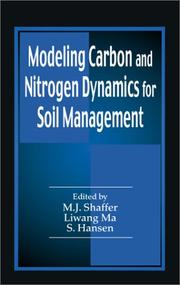
ISBN: 1566705290 9781566705295 Year: 2001 Publisher: Boca Raton Lewis
Abstract | Keywords | Export | Availability | Bookmark
 Loading...
Loading...Choose an application
- Reference Manager
- EndNote
- RefWorks (Direct export to RefWorks)
Soil management --- Soils --- 551.3 --- 551.3 External geodynamics (exogenous processes) --- External geodynamics (exogenous processes) --- Soil science --- Agronomy --- Earth (Soils) --- Mold, Vegetable --- Mould, Vegetable --- Soil --- Vegetable mold --- Agricultural resources --- Plant growing media --- Regolith --- Land capability for agriculture --- Carbon content --- Mathematical models --- Nitrogen content --- Management
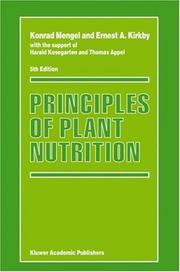
ISBN: 1402000081 079237150X 9401010099 9781402000089 9780792371502 Year: 2001 Publisher: Dordrecht: Kluwer Academic Publishers,
Abstract | Keywords | Export | Availability | Bookmark
 Loading...
Loading...Choose an application
- Reference Manager
- EndNote
- RefWorks (Direct export to RefWorks)
This is the 5th edition of a well-established book Principles of Plant Nutrition which was first published in 1978. The same format is maintained as in previous editions with the primary aim of the authors to consider major processes in soils and plants that are of relevance to plant nutrition.This new edition gives an up-to-date account of the scientific advances of the subject by making reference to about 2000 publications. An outstanding feature of the book, which distinguishes it from others, is its wide approach encompassing not only basic nutrition and physiology, but also practical aspects of plant nutrition involving fertilizer usage and crop production of direct importance to human nutrition. Recognizing the international readership of the book, the authors, as in previous editions, have attempted to write in a clear concise style of English for the benefit of the many readers for whom English is not their mother tongue. The book will be of use to undergraduates and postgraduates in Agriculture, Horticulture, Forestry and Ecology as well as those researching in Plant Nutrition.
Plants --- Nutrition. --- Botany --- Earth & Environmental Sciences --- Plant Physiology --- Plant physiology. --- Soil science. --- Soil conservation. --- Ecology . --- Plant Physiology. --- Soil Science & Conservation. --- Ecology. --- Balance of nature --- Biology --- Bionomics --- Ecological processes --- Ecological science --- Ecological sciences --- Environment --- Environmental biology --- Oecology --- Environmental sciences --- Population biology --- Conservation of soil --- Erosion control, Soil --- Soil erosion --- Soil erosion control --- Soils --- Agricultural conservation --- Soil management --- Pedology (Soil science) --- Agriculture --- Earth sciences --- Physiology --- Ecology --- Control --- Prevention --- Conservation --- Plants - Nutrition.

ISBN: 0521771714 Year: 2001 Publisher: Cambridge : Cambridge University Press,
Abstract | Keywords | Export | Availability | Bookmark
 Loading...
Loading...Choose an application
- Reference Manager
- EndNote
- RefWorks (Direct export to RefWorks)
Ressource en sol --- Soil resources --- Dégradation du sol --- Soil degradation --- Écologie --- ecology --- Gestion des ressources --- resource management --- Sciences du sol --- Soil sciences --- Agriculture --- agriculture --- Impact sur l'environnement --- Environmental impact --- Besoin d'information --- information needs --- Système d'information --- information systems --- Amérique du Nord --- North America --- Land use --- Soil and civilization. --- Soil management --- Environmental Sciences and Forestry. Soil Science --- History. --- Soil Science (General) --- Soil Science (General). --- agriculture. --- History
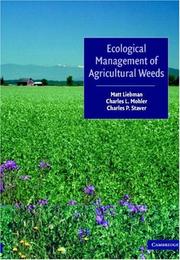
ISBN: 1107113091 1280417056 9786610417056 0511173857 0511017642 0511153112 0511327757 0511541813 0511053452 9780511017643 0511038216 9780511038211 9780521560689 0521560683 9780511053450 9780511173851 9780511541810 9781280417054 6610417059 9781107113091 9780511153112 9780511327759 9780521037877 0521037875 Year: 2001 Publisher: Cambridge : Cambridge university press,
Abstract | Keywords | Export | Availability | Bookmark
 Loading...
Loading...Choose an application
- Reference Manager
- EndNote
- RefWorks (Direct export to RefWorks)
Concerns over environmental and human health impacts of conventional weed management practices, herbicide resistance in weeds, and rising costs of crop production and protection have led agricultural producers and scientists in many countries to seek strategies that take greater advantage of ecological processes and thereby allow a reduction in herbicide use. This book provides principles and practices for ecologically based weed management in a wide range of temperate and tropical farming systems. After examining weed life histories and processes determining the assembly of weed communities, the authors describe how tillage and cultivation practices, manipulations of soil conditions, competitive cultivars, crop diversification, grazing livestock, arthropod and microbial biocontrol agents, and other factors can be used to reduce weed germination, growth, competitive ability, reproduction and dispersal. Special attention is given to the evolutionary challenges that weeds pose and the roles that farmers can play in the development of new weed-management strategies.
Weeds --- Agricultural ecology. --- Tillage. --- Agricultural systems. --- Farming systems --- Systems, Agricultural --- Systems, Farming --- Agricultural geography --- Farm management --- Cultivation of soils --- Soil cultivation --- Soil tillage --- Tilling --- Agricultural systems --- Agriculture --- Soil management --- No-tillage --- Agroecology --- Ecology --- Permaculture --- Pest plants --- Weed plants --- Weedy plants --- Plant pests (Plants) --- Agricultural pests --- Botany, Economic --- Plants --- Bio-control of weeds --- Biocontrol of weeds --- Biological control of weeds --- Weed biocontrol --- Weed biological control --- Biological control. --- Ecology. --- Environmental aspects --- Control --- noxious plants --- pest control --- Integrated control --- Biological control --- Plant competition --- Tropical zones --- Temperate zones --- world
| Listing 1 - 10 of 14 | << page >> |
Sort by
|

 Search
Search Feedback
Feedback About UniCat
About UniCat  Help
Help News
News